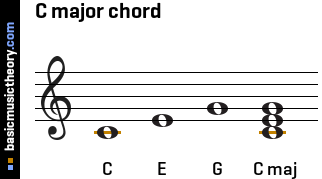Any chord, whether it be a guitar chord, piano chord, a chord that is sung or a chord that is played... any chord is made from a skeleton of 3 specific pitches.
The most basic foundation level chords are chords called Triads.
 A Triad chord is a chord that consists of 3 notes, each note being an interval of a 3rd away from the previous note.
A Triad chord is a chord that consists of 3 notes, each note being an interval of a 3rd away from the previous note.For example: Here is the triad of C major (it appears broken first and then stacked, as it would be when written as a chord).
The notes C, E and G are 3rds apart. Go and check with the Intervals post if you are unsure of what that means or how to figure it out (but from work in class you should absolutely understand that).
The easier, and more direct way of building a triad, is to remember the pattern:
- Root
- Third
- Fifth
What's your reference point though?
The name of the chord.
Let me explain this;
If we were to find out what the Triad of C major was, we would start by using the Root note of the triad.
How do you know what the root note is?
Because it will be the NAME of the chord.
So root note of C major triad? Obvious. C.
Then, using the same process as you would to identify an interval, you count up to 3, and then to 5, starting from the root both times.
Build the Triad of C major:
- Identify root note: C
- Identify the 3rd: Counting from root (and including root as 1), C,D,E; 1,2,3. The third is E.
- Identify the 5th: Counting from the root again,C,D,E,F,G; 1,2,3,4,5. The fifth is G.
Great, sorted. That's the process.
Triad of F major?
- Root: F
- 3rd: A
- 5th: C
You see the formula.
No comments:
Post a Comment
All comments will be moderated.